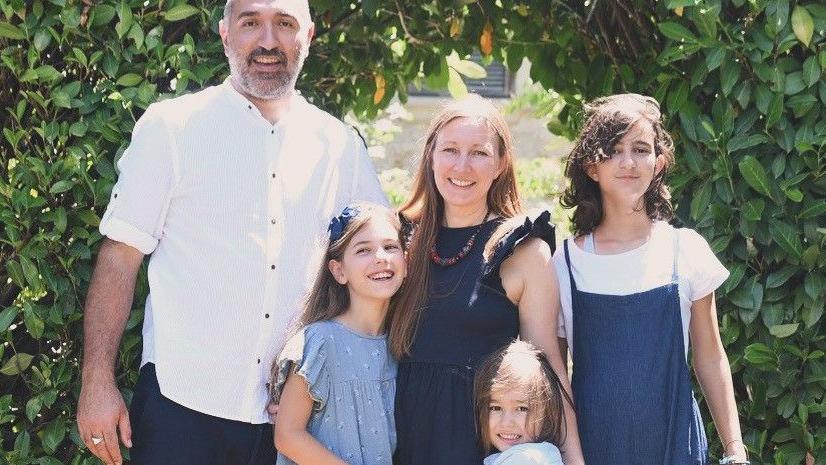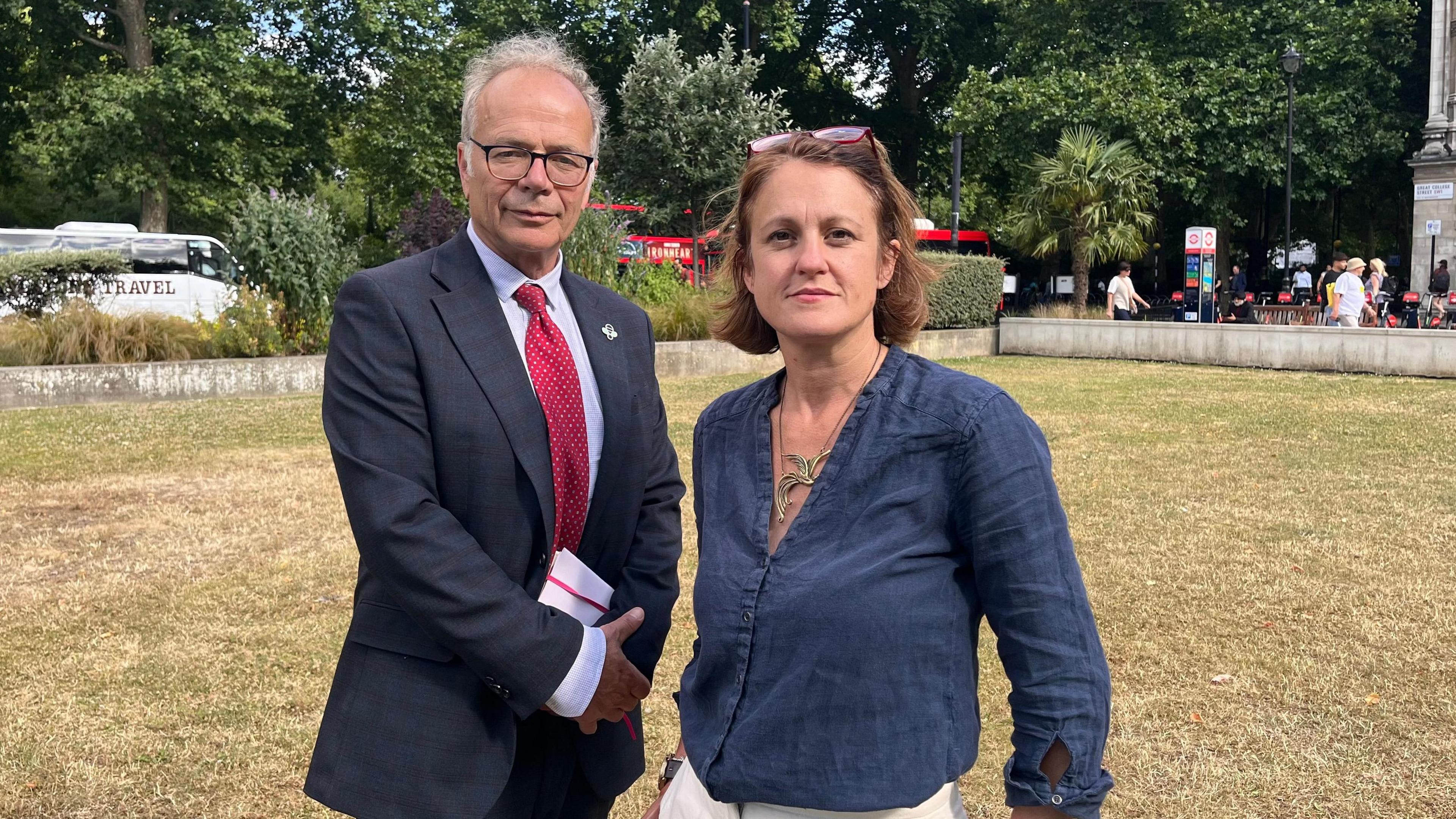'I can't live in my own country with my partner'

Rebecca Gray decided to move to Turkey to be with her husband because of UK family visa rules
- Published
The UK government is facing calls to scrap an immigration policy which puts "untold stress" on British citizens who choose to marry or cohabit with someone from abroad.
Citizens and settled residents wanting to sponsor their partner's visa application must earn a minimum income of £29,000 or have savings of £88,500.
MPs in Bristol and Stroud are urging the government to scrap the requirement which was brought in by the Conservatives to curb migration.
"What the government does next will make or break many families who just want to be together," said Caroline Coombs of the campaign group Reunite Families UK.
A Home Office spokesperson said the minimum income policy "needs to balance a respect for family life while also maintaining the UK's economic stability" and it is considering findings from a Migration Advisory Committee review.
For Rebecca Gray, 32, from Stroud in Gloucestershire, scrapping the policy would mean she could move back to the UK with her Turkish husband.
"I don't think people have any idea of how much harm the visa rules cause," she said.
Self-employed with a UK business but unable to meet the minimum income requirement, she has been living in Turkey for the past four years.
Together with her husband, Baran, 31, they have been saving to apply for a visa through the savings route.
She said: "We're holding off having children because we've been so focused on saving money to get him a visa."
Ms Gray said the couple has stronger family ties to the UK as her husband has lost both of his parents.
"We want to be close to family. Between us, we only have one parent left, that's my mum.
"I'm forced to live thousands of miles away from my family if I want to be with my husband."
Some countries, like the UK, set a minimum income requirement for a spouse visa.
But while other countries, like France and the Netherlands, align it to their national minimum wage, the UK sets it at a higher level.
The Migration Observatory, external estimates that roughly half of the UK working population earn under £29,000.
'My kids think I'm the man in the phone'
For a large number of applicants, the minimum income policy is not the only financial hurdle.
Visa fees and NHS surcharges can cost more than £7,000 for a five-year route to settlement, excluding any legal fees.
"It's unfair that only the wealthy can bring their partner here," said Leighton Allen, from Worcester.

Leighton Allen is trying to bring his fiancée and two children to the UK
Mr Allen, 30, works in retail and said he cannot meet the salary threshold to bring his Tanzanian fiancée and his two young children to the UK.
He said he tries to see them as much as possible, which can be three weeks in a year.
"All I want is to be a father to my children but I feel that choice is taken away from me. I'm financially supporting them but they don't see me."
He added: "They think I'm in the man in the phone."
The minimum income requirement was first introduced in 2012 to ensure the British partner or settled resident earned enough to financially support their foreign partner in the UK without resorting to public funds.
Last year, the salary threshold increased for the first time, from £18,600 to £29,000.
'I can't come home to care for my parents'
Following Brexit and the end of free movement between the UK and EU countries, some British citizens who had been living abroad - like Sarah Douglas - are also finding it hard to return to the UK with their families.
The 42-year-old lives in Italy with her husband Matteo and their three children.
She wants to move back home to Scotland with her family to be close to her elderly parents, and help care for them.
However, to follow the minimum income route, Ms Douglas would need to return without her Italian husband and accrue six months of UK payslips to apply for a spouse visa for him.

Sarah Douglas wants to move back home to Scotland with her family but they need to accrue savings of £88,500
"I could work as a teacher in the UK and my husband is a software engineer who would find work easily.
"We're financially stable, we don't rely on any support, but we're able to do that because we're together," she said.
To avoid separation, they have been struggling to save £88,500 in order to apply via the savings route.
"Saving this much money is putting financial strain on us and it's taking years, but we feel it's our only option."
She added: "If we were forced to separate, it would have a huge impact on us as a family. I've seen what that does to children and I don't want to put my children through that."
A report by children's charity Coram, external found children in separated families showed signs of stress, anxiety and inability to focus in school.
It also said that children living in families affected by the current minimum income requirement were likely to experience exacerbated challenges and poor mental wellbeing.
The report was commissioned by Reunite Families UK, a not-for-profit representing families affected by the UK family visa scheme.
Its co-founder and executive director, Caroline Coombs, said: "We have nearly 6,000 couples and families who are suffering on a daily basis.
"People feel completely unheard by their own government and they can't understand why they can't be here with their loved ones," she added.

Stroud MP Simon Opher (left) is supporting campaigner Caroline Coombs (right) who wants to see an end to the minimum income requirement
Earlier this month, the Home Office said it would examine findings from a Migration Advisory Committee review and issue a response in due course.
Migration experts suggested lowering the current threshold and gave a number of possible options.
They said, for example, lowering it to £24,000 would help ease family reunification and increase net migration by roughly 1-3%.
A Home Office spokesperson said: "We understand the Minimum Income Requirement for family visas needs to balance a respect for family life while also maintaining the UK's economic stability, which is why the Home Secretary commissioned the independent Migration Advisory Committee to undertake a review.
"We are now considering its findings and will respond in due course."
Migration is 'too high'
Conservative MP for Kent, Katie Lam, who is opposition assistant whip, defended an increase in the minimum income requirement.
"Migration has been far too high for the last two decades and remains so," she said.
"The public has consistently asked successive governments to lower migration.
"The last (Conservative) government promised to do exactly this, but like the governments before it, it did not deliver it."
At a parliamentary debate about the family visa income requirement in January, she said: "The question is not should British citizens be able to bring their foreign spouses to the UK.
"The question is, does it benefit the country as a whole for British citizens on lower salaries to bring foreign spouses here who are unable to get a visa any other way?"
But co-leader of the Green Party and Bristol Central MP, Carla Denyer, who has called the minimum income requirement a 'tax on love', - and wants it scrapped.
"The Home Office is failing not just people who are moving to the UK but British people who already live here and just want to enjoy family life in peace," she said.
"The minimum income requirement puts untold stress on couples and families and it should be scrapped entirely."
Family doctor and Labour MP for Stroud, Simon Opher, sponsored an exhibition in the Houses of Parliament last week which showcased the human impact of the family visa rules.
"We're splitting up people who love each other, splitting families who are the bedrock of our society, and I think it's the wrong policy," he said.
Get in touch
Tell us which stories we should cover in Bristol
Follow BBC Bristol on Facebook, external, X, external and Instagram, external. Send your story ideas to us on email or via WhatsApp on 0800 313 4630.
Related topics
- Published23 January

- Published11 June

- Published24 April 2024
